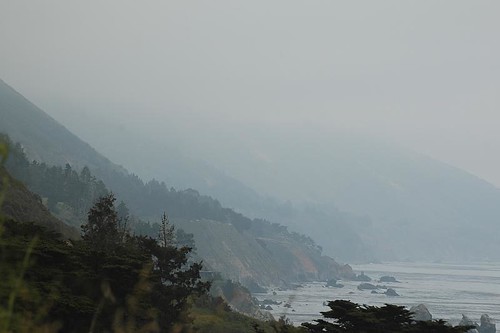
So yesterday I went to Malibu and I passed the areas that were burnt during the fire a few months ago. As I passed these not only did I see the skeletons of trees but I found new homes being built in the same areas. The first thing that came to my mind was "how could these people continue building on these lands knowing what happened? Are they really idiots?" Moreover this reminded me of a comment made by a person in the Los Angeles area on the radio station KIIS FM when the Malibu fires were going on. He asked a very provocative question: why should I be paying with my hard earned cash to put out these fires for these rich people who chose to be in a place away from the rest of the people? If they decided to be there why can't they just pay for it themselves. It is a risk they decided to take on their own. At first I found this argument very absurd. I couldn't believe how seeming selfish it was. But now thinking about it, its quite true.

To explain a little bit about why I'm writing this is because of this article I read on National Geographic the July issue. The title is "Why is the West burning". (The link to this article is posted at the bottom of this entry.) Also, since I live in California, the wildfires are extremely close to me. I remember when the fries were going on about a few months ago and I thought to myself how Southern California was practically in flames. Now, the North is in flames. You have a huge fire in Goleta in Santa Barbara Country and the worst one in Big Sur which is at the end of Los Padres National Forest. A lot of people don't know how insanely gorgeous Big Sur is. I have a few pictures that I pulled up from Google Images but I don't think you can actually see it unless you have been there. That is why it is such a shame to see it all go up in flames. A few days ago our California Governor Arnold Schwarzenegger went to Goleta to see the damage and he proposed a new bill to help aid the fire. He calls for a $10 to $12 increase in insurance to pay for better firefighting equipment. I believe this is a good idea however it does not address the root of the problem. The fact is that we should stop building in fire prone areas. The numbe
 r one cause of fires especially in the West is homes. I just find it idiotic that we keep building in these areas where we know that the ground just wants to go up in flames. At least in California which is all Chaparral, the vegetation needs to go up in flame once in a while to live. If we do decided to build in these areas then we should invest a little bit more money and buy fire proof materials for our homes. The cheapest one is adobe. This helps to minimize the amount of damage and possibly help combat these wildfires. Its not a bad idea at all.
r one cause of fires especially in the West is homes. I just find it idiotic that we keep building in these areas where we know that the ground just wants to go up in flames. At least in California which is all Chaparral, the vegetation needs to go up in flame once in a while to live. If we do decided to build in these areas then we should invest a little bit more money and buy fire proof materials for our homes. The cheapest one is adobe. This helps to minimize the amount of damage and possibly help combat these wildfires. Its not a bad idea at all.The other idea I found interesting was that we should allow the fire to just keep going. The land needs to ignite. Many of our native trees need to have fire to reproduce because the seeds are covered in wax that has to be melted by fire to come out. Our stance on fire since Pinchot was the US Forestry department head was to combat fires at all costs but because of this we destabilized the environment. We were never supposed to have so many trees in such a small place. So the best way is to have controlled fires and burn off the excess shrubs that do cause massive fires.
But anyways, I don't want to write more about it because I would prefer if you would read the article on National Geographic. I highly recommend it.
http://ngm.nationalgeographic.com/2008/07/fire-season/shea-text




